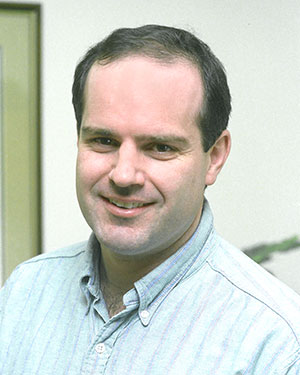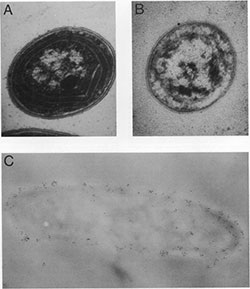News and Events
Contact us
Through the Administrative Office email Directory
or
Departmental Mailing Address:
Department of Biology,
Biological & Geological Sciences Building,
Western University,
London, Ontario, Canada N6A 5B7
Departmental Phone:
519-850-2542
Departmental Fax:
519-661-3935
Dr. David Laudenbach Biography
August 23, 1959 – June 16, 1995
by Rebecca St. Pierre
A truly exceptional scientist arrived at Western’s Plant Sciences Department in 1991.
 Dr. David Laudenbach completed his B.Sc. (1982) in Biology, and both his M.Sc. (1983), and Ph.D. (1987) in the Botany Department at the University of Toronto. His postdoctoral studies from 1988 to 1990, were under the leadership of Arthur Grossman at the Carnegie Institute of Washington Stanford University, in California.
Dr. David Laudenbach completed his B.Sc. (1982) in Biology, and both his M.Sc. (1983), and Ph.D. (1987) in the Botany Department at the University of Toronto. His postdoctoral studies from 1988 to 1990, were under the leadership of Arthur Grossman at the Carnegie Institute of Washington Stanford University, in California.
It was the late 80’s when Western was granted permission to recruit two scientists for a new unit to be opened in 1991, the Molecular Genetics Unit or MGU. Dr. Anthony Percival-Smith, a zoologist, and Dr. David Laudenbach, were hired concurrently. “He was the first young plant molecular biologist that we hired…he was excellent,” as recalled by Dr. Norm Huner, who in 1993 learned molecular biological techniques in Dr. Laudenbach’s laboratory. The MGU, located on the third floor of the Western Science Centre, grew to include six faculty members, a collaboration of the Plant Sciences and Zoology Departments. In 2002 the two departments merged into the Biology Department.
Dr. Laudenbach quickly established his laboratory. Eager to begin his research, he worked out of the Biology and Geology Building until the Western Science Centre was completed. Focused on molecular components and regulatory mechanisms of photosynthetic microorganisms, he utilized molecular genetic techniques to study their adaptation to sulfur limitation and oxidative stress. At the time of his passing, he had authored twenty four publications, including two book chapters. Within his short lifetime, he became internationally recognized for his research on the molecular genetics of Cyanobacteria.
Colleague Dr. Shiva Singh remembered him as “…one of those exceptional researchers who always were ahead…thinking ahead. He wasn’t a follower, he was a leader, a leader in his field.” He added, “I knew he was going to be our chair sooner or later. I knew he was going to put us on the map by his scientific excellence...” The Molecular Biology Graduate Program Steering Committee in the Faculty of Science, and the Departmental Undergraduate Teaching Committee, were two of the many administrative roles he served. “He was involved with the department…when it came to issues about policy...He had those qualities that you would expect to see develop into some sort of leadership role,” noted Dr. Percival-Smith.
“In recognition of teaching excellence,” he was awarded status on the University Students’ Council Teaching Honour Roll in the academic year 1995 to 1996. Credited for the introduction of DNA sequencing into the Plant Sciences Department, specifically the fourth year student laboratories, he taught undergraduate courses in genetics and plant sciences.
He was dedicated to the five graduate students, two postdoctoral fellows, and visiting scientist that he supervised  in his four years at Western. A graduate student in his laboratory Dr. Andrea Gilpin recalled “…he was a very encouraging and supportive teacher and certainly played at the time a role of a mentor for me.” A positive force in their lives, he fostered their strengths and under his guidance they flourished. “We would have these fabulous conversations just about science…,” Dr. Martina Celerin fondly remembered of her graduate studies. She continued, “…Although it was a mentor student relationship; it was very much a peer relationship at the same time. He was an incredibly respectful person as well as being a really great teacher.”
in his four years at Western. A graduate student in his laboratory Dr. Andrea Gilpin recalled “…he was a very encouraging and supportive teacher and certainly played at the time a role of a mentor for me.” A positive force in their lives, he fostered their strengths and under his guidance they flourished. “We would have these fabulous conversations just about science…,” Dr. Martina Celerin fondly remembered of her graduate studies. She continued, “…Although it was a mentor student relationship; it was very much a peer relationship at the same time. He was an incredibly respectful person as well as being a really great teacher.”
A sports enthusiast, “…he was passionate about hockey,” recalled Dr. Huner. He ensured grant money received, was well spent. He enjoyed bargaining for the best price on both equipment and supplies, and often received it. Among his many special qualities, were both attentiveness and patience. Committed to his scientific research, he was also devoted to his wife Lori, and their two children Adam and Teresa. Dr. Celerin has retained “this wonderful visual” of Adam and Dr. Laudenbach sitting at his office computer one Saturday afternoon.
In 1995 severe, debilitating headaches were diagnosed due to a benign brain tumour. During surgery to remove the growth, Dr. Laudenbach died due to unforeseen complications. Dr. Singh described his sudden death as a “tremendous loss…He really was I guess the kind of person we were looking for to build our hopes and dreams…” Papers were dedicated to the late Dr. David Laudenbach in Photochemistry and Photobiology, Plant Physiology and the Journal of Bacteriology.
To reflect what they felt would be their son’s wishes, Dr. Laudenbach’s parents requested a scholarship fund and lecture series be initiated in his honour. The graduate student recipient, in addition to an academic requirement, must demonstrate a balance of research with that of university, social and family commitments. In recognition of one of Western’s most valued MGU faculty members, the Laudenbach lectures focus on molecular biology. Dr. Grossman would present the first lecture in the Laudenbach Lecture series in November of 1995. His M.Sc. and Ph.D supervisor, Dr. Neil Straus, would give the second lecture. Assistant Professor Dr. Laudenbach’s contribution to Western is immortalized on a bench near the Western Science Centre.
He is remembered as an esteemed colleague, teacher, and mentor.

